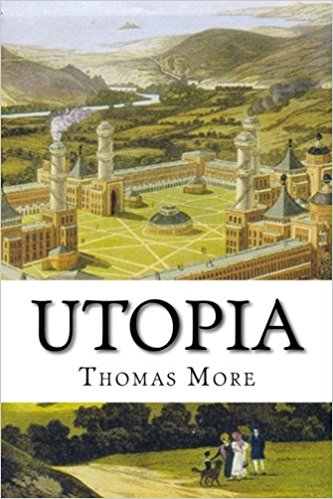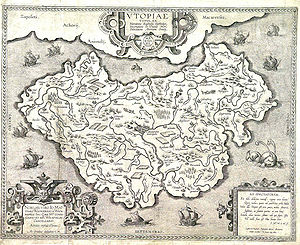|
Utopia by Sir Thomas More Published in 1516 135 Pages Thibault’s Score: 3/5 My whole life, I have heard people use the word “Utopia” (which means “not a place” in Greek), but had never read the book which coined the word. The book describes a fictional republic with a perfect political system. The entire book takes the form of a dialog between a British man and a traveller, Raphael, who has returned from Utopia. Considering that the book was written in 1516, I found it to be very clear and well written. Like many authors of his time, More writes in a style that requires the reader to pay attention on every word and skip nothing. Although Raphael makes Utopia sound like a wonderful place, I would absolutely hate to live in the state which is described. The characters talk about Utopia as if it is a wonderful place, but in fact describe a society which, by modern terms, can only be understood as dystopian communism. The economy of Utopia is completely centrally planned.There is no private property, instead the government decides everything. Every city has the same amount of resident, and people are moved around in order to keep the size of the cities balanced. All citizens are assigned homes and aren’t allowed to keep any home for more than a decade. People have no freedom to chose their own jobs, with some exceptions for prodigies who are misaligned. Work is mandatory. There is a welfare state, complete with voluntary euthanasia to keep the costs down. All the poor and disabled are supplied and provided for by the fit and able. All meals are served in communal dining halls. Utopia can also be seen as an early example of feminist literature. More predicts many rights for women in Utopia that wouldn’t be implemented in Europe for another 300 years. Women enjoy the right to divorce their unfaithful and degenerate husbands. Women have the right to hold religious offices, and some are even trained as soldiers. There are, however, still patriarchal institutions in society. For example, grooms can inspect their brides naked bodies before marriage to make sure that they have no hidden deformities. (Makes me wonder if Thomas More’s wife had some hidden deformities) There are also many aspects of Utopian society which would be viewed as absolutely reprehensible by modern communists, although these transgressions can be forgiven because of the time and context that the author lived in. For example, Utopia has a very large population of slaves, mostly criminals and captured enemy combatants. Premarital sex is punished by enforced celibacy and adultery is punished by slavery. The idea of a totalitarian Utopia dates back to Plato’s “The Republic” (which I am reading next), and understanding the history of failed Utopias puts modern Marxism into context.
Like all communist dreams, Utopia is flawed not in execution but also in conception. Although the people are well provided for, they lack freedom and adventure. Their lives are controlled and regulated, there are no options or ways out for nonconformists and rebels. Freedom aside, Thomas More, like all communists, ignores the much more practical problems of scarcity and poor incentives. To me the most interesting aspect of the book was discovering that totalitarian communist dream which was attempted in the 20th century had been fully conceptualized by the 16th century. This book is worth reading for people who are interested in understand modern Marxism and its intellectual roots.
1 Comment
5/17/2023 07:56:44 am
I wanted to express my gratitude for your insightful and engaging article. Your writing is clear and easy to follow, and I appreciated the way you presented your ideas in a thoughtful and organized manner. Your analysis was both thought-provoking and well-researched, and I enjoyed the real-life examples you used to illustrate your points. Your article has provided me with a fresh perspective on the subject matter and has inspired me to think more deeply about this topic.
Reply
Leave a Reply. |
Thibault SerletMost of my articles are book reviews, but I also write about many other topics. Archives
December 2023
Categories |


 RSS Feed
RSS Feed